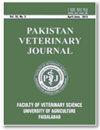杆状病毒表达犬犬犬尿氨酸3-单加氧酶用于犬乳腺肿瘤诊断
IF 5.4
3区 农林科学
Q1 VETERINARY SCIENCES
引用次数: 1
摘要
接收:修订:接受:在线发布:2019年7月28日2020年1月5日2020年01月09日2020年02月03日犬尿氨酸3-单加氧酶(KMO),一种线粒体外膜酶,是犬尿氨素途径的核心,已被证明与人类癌症的恶性肿瘤有关。狗的癌症被认为是可靠的和临床相关的人类疾病模型,因为这些人类和狗的肿瘤在自然史上有相似之处,而且狗和人的癌症在解剖结构、拓扑结构、转移模式和治疗反应方面有表面相似之处。本研究旨在建立一种制备重组犬KMO蛋白的有效方案,以备在犬癌症研究中的潜在应用。利用SWISS-MODEL提供的同源性模型对犬KMO的氨基酸序列和结构进行了分析。犬KMO(cKMO)是通过使用杆状病毒-昆虫细胞(Sf9细胞)表达系统产生的。全长cKMO由杆状病毒感染的Sf9细胞表达为分子量为55kDa的477氨基酸蛋白。从2×10杆状病毒感染的Sf9细胞中平均获得2mg的蛋白质产量。western印迹和免疫荧光分析结果表明,KMO可在Sf9细胞的胞浆和线粒体中成功表达。纯化的重组KMO蛋白可作为产生抗cKMO抗体的抗原,进一步研究其在犬癌变中的作用。©2020 PVJ。保留所有权利本文章由计算机程序翻译,如有差异,请以英文原文为准。
Expression of Canine Kynurenine 3-Monooxygenase by Baculovirus for Canine Mammary Tumor Diagnosis
Received: Revised: Accepted: Published online: July 28, 2019 January 05, 2020 January 09, 2020 February 03, 2020 Kynurenine 3-monooxygenase (KMO), an outer mitochondrial membrane enzyme that is central to the kynurenine pathway, has been demonstrated to be associated with malignancy in human cancers. Cancers in dogs are considered reliable and clinically relevant models of human diseases owing to similarities in the natural history of these human and canine tumors and the superficial resemblances in the anatomy, topology, metastatic patterns, and response to therapy between canine and human cancers. This study aims to establish an efficient protocol to prepare the recombinant canine KMO protein for potential application in canine cancer study. The amino acid sequence and structure of canine KMO were analyzed using homology modeling provided by SWISS-MODEL. The canine KMO (cKMO) was produced by using a baculovirus–insect cell (Sf9 cells) expression system. Fulllength cKMO was expressed by the baculovirus-infected Sf9 cells as a 477-aminoacid protein with a molecular weight of 55 kDa. On average a yield of 2 mg of protein was obtained from 2 × 10 baculovirus-infected Sf9 cells. The results from western blot and immunofluorescent assay showed KMO can be successfully expressed by Sf9 cells within the cytosol and mitochondria. The purified recombinant KMO protein could be used as an antigen for generating anti-cKMO antibodies to further investigate the role in canine carcinogenesis. ©2020 PVJ. All rights reserved
求助全文
通过发布文献求助,成功后即可免费获取论文全文。
去求助
来源期刊

Pakistan Veterinary Journal
兽医-兽医学
CiteScore
4.20
自引率
13.00%
发文量
0
审稿时长
4-8 weeks
期刊介绍:
The Pakistan Veterinary Journal (Pak Vet J), a quarterly publication, is being published regularly since 1981 by the Faculty of Veterinary Science, University of Agriculture, Faisalabad, Pakistan. It publishes original research manuscripts and review articles on health and diseases of animals including its various aspects like pathology, microbiology, pharmacology, parasitology and its treatment. The “Pak Vet J” (www.pvj.com.pk) is included in Science Citation Index Expended and has got 1.217 impact factor in JCR 2017. Among Veterinary Science Journals of the world (136), “Pak Vet J” has been i) ranked at 75th position and ii) placed Q2 in Quartile in Category. The journal is read, abstracted and indexed internationally.
 求助内容:
求助内容: 应助结果提醒方式:
应助结果提醒方式:


